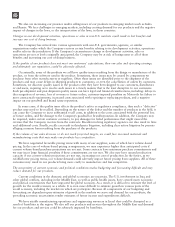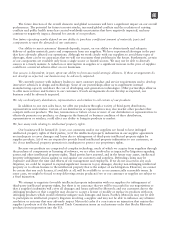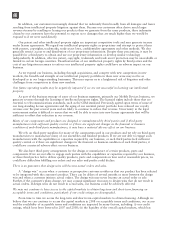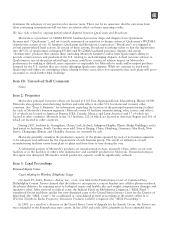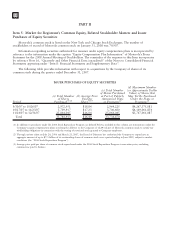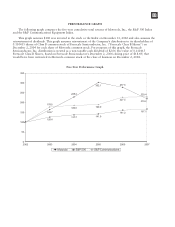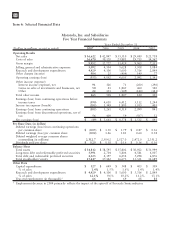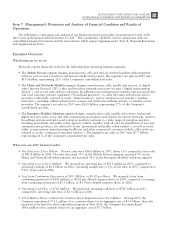Motorola 2007 Annual Report Download - page 37
Download and view the complete annual report
Please find page 37 of the 2007 Motorola annual report below. You can navigate through the pages in the report by either clicking on the pages listed below, or by using the keyword search tool below to find specific information within the annual report.
Iridium India Lawsuits
Motorola and certain of its current and former officers and directors were named as defendants in a private
criminal complaint filed by Iridium India Telecom Ltd. (“Iridium India”) in October 2001 in the Court of the
Extra Judicial Magistrate, First Class, Khadki, Pune, India. The Iridium India Telecom Ltd. v. Motorola, Inc. et al.
complaint alleges that the defendants conspired to, and did, commit the criminal offense of “cheating” by
fraudulently inducing Iridium India to purchase gateway equipment from Motorola, to acquire Iridium stock, and
to invest in developing a market for Iridium services in India. Under the Indian penal code, “cheating” is
punishable by imprisonment for up to 7 years and a fine of any amount. The court may also require defendants to
compensate the victim for its losses, which the complaint estimates at about $100 million. In August 2003, the
Bombay High Court granted Motorola’s petition to dismiss the criminal action against Motorola and the
individual defendants. Iridium India has petitioned the Indian Supreme Court to exercise its discretion to review
that dismissal, and that petition is pending.
In September 2002, Iridium India also filed a civil suit in the Bombay High Court against Motorola and
Iridium. The suit alleges fraud, intentional misrepresentation and negligent misrepresentation by Motorola and
Iridium in inducing Iridium India to purchase gateway equipment from Motorola, to acquire Iridium stock, and to
invest in developing a market for Iridium services in India. Iridium India claims in excess of $200 million in
damages and interest. Following extensive proceedings in the trial court and on appeal related to Iridium India’s
motion for interim relief, Motorola has deposited approximately $44 million in a specially designated account in
India, and the Indian Supreme Court has accepted for a full hearing at a later date Motorola’s appeal regarding
interim relief.
Shareholder Derivative Case—Iridium and Telsim
M&C Partners III v. Galvin, et al., filed January 10, 2002, in the Circuit Court of Cook County, Illinois, is a
shareholder derivative action against fifteen current and former members of the Motorola Board of Directors and
Motorola as a nominal defendant. The lawsuit alleges that the Motorola directors breached their fiduciary duty to
the Company and/or committed gross mismanagement of Motorola’s business and assets by allowing Motorola to
engage in improper practices with respect to Iridium and Telsim (as defined below).
In April 2006, the Court held that the plaintiff could not pursue its Iridium-related claims, but denied without
prejudice plaintiff’s motion to file a Third Amended Complaint with respect to new allegations pertaining to
Telsim. Following the Court’s ruling for defendants on the Iridium-related claims and plaintiff’s July 20, 2006
demand with respect to Telsim-related claims, the Motorola Board of Directors appointed an investigatory
committee to investigate those Telsim-related claims. On November 13, 2007, after considering the July 2006
demand, proposed complaint, and recommendations made by the Board’s investigatory committee, the Board
concluded that the evidence does not support M&C Partners III’s proposed claims and prosecution of these claims
would not be in the best interests of Motorola’s shareholders. Accordingly, the Board rejected M&C Partners III’s
demand.
An unfavorable outcome in one or more of the Iridium-related cases still pending could have a material
adverse effect on Motorola’s consolidated financial position, liquidity or results of operations.
Telsim-Related Cases
In April 2001, Telsim Mobil Telekomunikasyon Hizmetleri A.S. (“Telsim”), a wireless telephone operator in
Turkey, defaulted on the payment of approximately $2 billion of loans owed to Motorola and its subsidiaries (the
“Telsim Loans”). The Uzan family controlled Telsim until 2004 when an agency of the Turkish government took
over control of Telsim. Telsim was sold by the Turkish government to Vodafone and Motorola received an
aggregate payment from the sale of $910 million.
29



